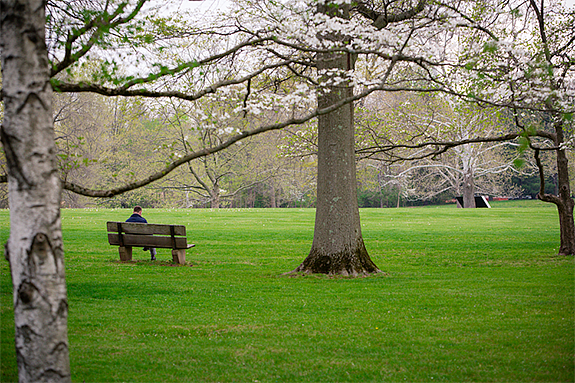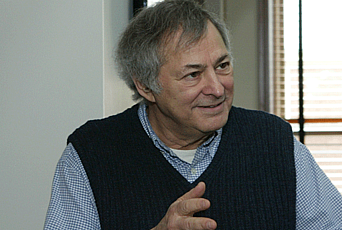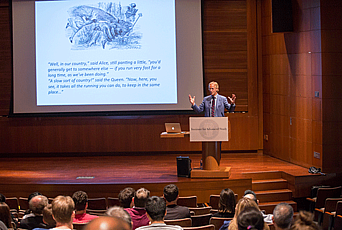The Professor and the Politician

On a beautiful overlook near the university, a middle-aged man is enjoying the view of the majestic Fjord. Judging from his clothing, he is a stonemason from the quarry just below him. But actually, he is a professor at the university who often comes up here just to sit and think about deep and complex problems. Up here many good ideas have come to him over the years.
A man in a suit and tie rushes up the path, breathing heavily, cheeks flushed, and appearing quite worn out by the walk. He is a politician – the Secretary of the Ministry of Science and Research on his way to a meeting in the Government's new Committee of Effectivity in Research.
The politician—quickly taking in the view—politely greets the professor and inquires, “who are you and what are you doing here in the middle of the day?”
“I am a professor at the university and I am sitting here to think about things. I’ve had many good ideas here over the years. At the moment I am working on a deep and complex problem that will require some time until it is solved,” he answers.
The politician is surprised to find a professor idling here without any apparent purpose in the middle of the working day.
“Wouldn’t it be better to sit in your office and work?” asks the politician.
“No!” says the professor. “I feel less stressed and much more open to thoughts here.”
“Listen,” says the politician, “it would be much better for you to sit in your office and write an article about problems that are not as difficult.”
“I don’t think that would be very interesting and not as relevant for the development of my field. So, why should I do that?” answers the professor.
“But that is exactly what we would like to achieve in our Effectivity Committee. Scientists should not think about problems that are too difficult, but rather focus on problems that will increase the number of publications. Then our numeric criteria can be applied to evaluate your work in a simple way, which will allow us to confirm the quality of your work immediately.”
“I don’t believe that would work. So, why should I do that?” answers the professor.
The politician is about to give up, but continues:
“When you get a high publication rating according to our numeric scale, third parties, including myself, will appreciate your work more, and you will get an opportunity to receive a lot of research resources and to hire many people.”
“That won’t solve my problem, because I will spend most of my time with management tasks instead of using it to work on the problem.”
“If you write articles about simpler problems, you will have so many resources that you can also hire a manager. Maybe you will even get your own department.”
“That is not appealing to me,” says the professor. “More people does not mean that I will be able to solve my problem, and they will just distract me.”
“I don’t think so,” says the politician. “We think that when we give money in order to increase the volume, the quality will improve as well.”
“Nonsense!” says the professor. The atmosphere becomes a little bit tense at this point. But the politician who is used to this kind of debate presses on:
“Wouldn’t it be wonderful, if you were in charge of a large group of scientists and had your own department where everybody could work on your problem?”
“So, what would I do?” asked the professor.
The politician is completely taken by surprise and answers:
“You could simply sit somewhere and take your time to think.”
“But that is exactly what I am doing now,” answers the professor.
The politician barely listens to the answer and rushes to his meeting with the Effectivity Committee. Perhaps with some new thoughts and a bit of envy?
Freely adapted from: Heinrich Böll, “Anekdote zur Senkung der Arbeitsmoral” (Anecdote about the Lowering of Productivity).
This article was originally published by Dagens Næringsliv (Oslo, 29 September 2016) and has been translated from Norwegian to German and to English.


